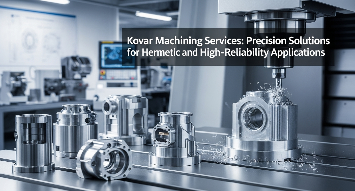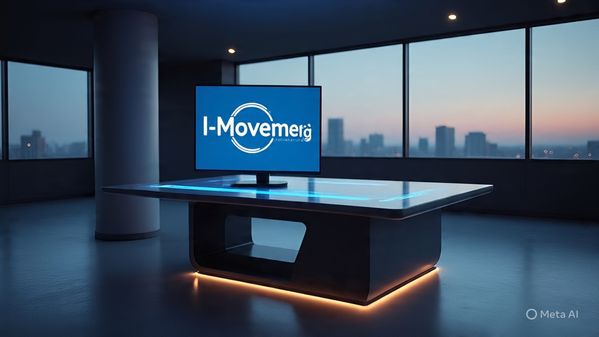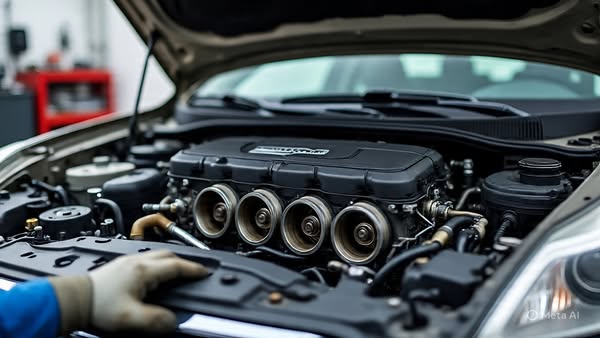
Kovar Machining Services: Precision Solutions for Hermetic and High-Reliability Applications
When your project calls for tight tolerances, exceptional material stability, and reliable hermetic sealing, you need a partner who understands the nuances of specialty alloys inside and out. Kovar machining services offer that precise blend of metallurgical expertise and advanced fabrication techniques—ensuring parts perform flawlessly in demanding environments. Whether you’re designing glass-to-metal feedthroughs for aerospace electronics, medical-device connectors, or high-vacuum packaging, this article will walk you through everything you need to know to leverage Kovar machining to its fullest potential.
Introduction
You’ve likely encountered Kovar components without realizing it. From pacemaker housings to satellite instrumentation, this iron–nickel–cobalt alloy is prized for matching the thermal expansion of borosilicate glass—making hermetic seals leakproof over extreme temperature cycles. Yet, its unique properties also introduce machining challenges: work-hardening, burr formation, and tool wear can quickly derail a project if not managed properly.
In today’s fast-paced manufacturing landscape, suppliers offering comprehensive Kovar machining services stand out by blending decades of hands‑on experience with the latest CNC and EDM technology. In the sections below, you’ll gain:
-
A clear understanding of what makes Kovar special.
-
Insight into why machining it is a distinct discipline.
-
A deep dive into the core techniques and best practices.
-
Real‑world case studies that demonstrate success.
-
Guidance on selecting the perfect partner for your next mission‑critical build.
By the end, you’ll feel confident specifying Kovar components like a seasoned engineer—tapping into high‑precision, hermetic sealing know‑how that sets your product apart.
Understanding Kovar: Material Properties and Applications
What Is Kovar?
Invented in the 1950s to address early semiconductor packaging challenges, Kovar is an iron‑nickel‑cobalt alloy (roughly 29% Ni, 17% Co, balance Fe) formulated to expand almost identically to borosilicate glass between –65 °C and +200 °C. This coefficient of thermal expansion (CTE) match is the cornerstone of hermetic glass‑to‑metal seals—critical wherever glass windows, insulators, or feedthroughs meet metal housings.
Unique Metallurgical Characteristics
-
Matched Thermal Expansion: Deviation from glass CTE is within ±0.5 × 10⁻⁶ /°C.
-
Work Hardening: Kovar becomes significantly harder as it deforms; unplanned cold work can lead to cracking or excessive tool wear.
-
Corrosion Resistance: The cobalt addition confers stability against oxidation up to ~700 °C, though passivation treatments are often applied post‑machining.
These traits enable Kovar parts to maintain hermeticity across harsh thermal cycles, but they also demand specialized tooling and process controls.
Typical Applications
-
Aerospace Electronics: Hermetic feedthroughs in satellite communication modules.
-
Medical Devices: Implantable electronics requiring biocompatible, sealed housings.
-
Optoelectronics: Laser diode packages where glass windows must remain flawless under thermal stress.
-
Automotive Sensors: High‑voltage connectors and pressure sensors operating from –40 °C to +150 °C.
Why Choose Kovar Machining Services?
Outsourcing to a dedicated Kovar specialist isn’t just about handing off a drawing. It’s about tapping into institutional knowledge—and avoiding pitfalls that can cost weeks in rework.
-
Deep Metallurgical Expertise.
Seasoned teams anticipate work‑hardening and recommend pre‑annealing schedules that balance machinability with final part strength. -
Advanced CNC & EDM Capabilities.
From five‑axis milling of intricate dovetail grooves to wire EDM cuts for ceramic‑to‑metal seals, integrated centers streamline production and quality control. -
Precision Quality Systems.
ISO 9001 and AS 9100D certified shops use in‑process gaging, CMM checks, and statistical process control (SPC) to maintain tolerances as tight as ±5 µm. -
Hermetic Leak Testing.
Helium mass spectrometry and fine bubble testing ensure every seal passes leak rates down to 10⁻⁹ atm cc/sec—non‑negotiable in medical implants and aerospace.
Engineer Insight: “When we switched from generic alloy suppliers to a niche Kovar machining provider, our hermetic seal failure rate dropped by over 80%,” notes Jane Rodriguez, Senior Packaging Engineer at AeroPlex Systems. “Their in‑house annealing, machining, and leak‑testing workflow saved us months on our radar‑altimeter program.”
By partnering with experts, you mitigate risk, accelerate time to market, and ensure your components meet rigorous industry standards without compromise.
Key Techniques in Kovar Machining
Kovar isn’t your run‑of‑the‑mill steel. It demands a thoughtful machining roadmap, combining multiple processes to achieve complex geometries and surface finishes.
CNC Milling
-
Tooling: Solid‑carbide end mills with TiN/TiAlN coatings resist adhesive wear from nickel content.
-
Parameters: Light depths of cut (0.1–0.2 mm) and high cutting speeds (~200 m/min) reduce work‑hardening ahead of the tool.
-
Coolant: Flood coolant with extreme pressure (EP) additives flushes chips from tight pockets.
Wire EDM
-
Precision Cuts: Achieves ±2 µm accuracy on intricate profiles, eliminating burrs common in conventional milling.
-
Surface Integrity: Low‑stress, spark‑erosion finish preserves material microstructure, ideal for hermetic interfaces.
Surface Grinding
-
Final Flatness: Lapping and fine‑grit wheels ensure landing faces for glass preforms are within 0.5 µm flatness.
-
Polishing: Chemical‑mechanical polishing (CMP) can be applied where optical clarity or mirror‑like surfaces are required.
Process Comparison
| Technique | Tolerance | Typical Surface Finish (Ra) | Ideal Use Case |
|---|---|---|---|
| CNC Milling | ±0.01 mm | 0.4–1.2 µm | Bulk material removal, basic geometry |
| Wire EDM | ±0.002 mm | 0.1–0.4 µm | Intricate profiles, burr-free sealing surfaces |
| Surface Grinding | ±0.005 mm | 0.05–0.20 µm | Final flatness, mirror finishes |
Best Practices for Optimal Results
-
Pre‑ and Post‑Machining Annealing
Kovar should be solution‑annealed (1,020 °C, 15 minutes, slow cool) before rough machining to normalize the microstructure. A final stress‐relief anneal post-machining prevents crack initiation during seal assembly. -
Custom Tool Path Strategies
Adaptive milling cycles with trochoidal tool paths reduce heat buildup and maintain chip evacuation, extending tool life. -
Inline Quality Checks
Integrate laser scanning or in‑spindle probing after rough passes to detect deviation early—allowing mid‑process adjustments rather than scrapping parts at inspection. -
Surface Treatment
After machining, a mild acid pickle (e.g., sulfuric solution) removes any iron oxide layers. Passivation in nitric acid then restores corrosion resistance without compromising hermetic qualities.
Real-World Case Studies
Medical Sensor Feedthroughs
A leading cardiac‑monitoring device manufacturer approached a Kovar machining services provider to produce multi‑pin feedthroughs for implantable sensors. Initial attempts with standard stainless alloys led to glass cracks during thermal cycling. By switching to a Kovar solution, the vendor achieved:
-
Zero glass‐cracking incidents across 1,000 units tested at –40 °C to +125 °C cycles.
-
50% reduction in seal assembly time thanks to precise concentricity (<5 µm runout).
-
Full FDA compliance through documented process controls and biocompatibility reports.
Aerospace Oscillator Packages
For a next‑generation avionics project, engineers needed compact, hermetically sealed oscillator enclosures capable of operating up to 15,000 ft altitude with ±0.1 ppb stability. The Kovar specialist delivered:
-
Custom micro‑channels for hermetic welds, fabricated via fine‐wire EDM.
-
Consistent leak rates below 10⁻⁹ atm cc/sec, verified by helium mass spectrometry.
-
On‑site assembly support, guiding the integrator through brazing protocols to avoid glass fracture.
Choosing the Right Kovar Machining Partner
When evaluating potential suppliers, consider these critical factors:
-
Certifications & Compliance
Look for ISO 9001:2015 and industry‑specific standards (e.g., ISO 13485 for medical devices, AS 9100D for aerospace). A supplier’s quality manual should detail Kovar‑specific procedures, including annealing, machining, and leak testing. -
Process Integration
Partners offering turnkey solutions—combining annealing, machining, surface treatment, and hermetic testing—minimize handling risk and compress lead times. -
Equipment & Capacity
Verify they house 5‑axis machining centers and fine-wire EDM, as well as dedicated grinding and polishing cells. Check throughput rates and on-demand scalability if your production volumes change. -
Technical Collaboration
A consultative approach—where engineers review your drawings, suggest design optimizations (e.g., fillet radii to reduce stress concentration), and develop machining trials—ensures first‐pass success. -
Documentation & Traceability
Full batch traceability from melt lot through final inspection, with digital signatures and material certificates, is non-negotiable for regulated industries.
Conclusion
Kovar machining services represent a vital niche in high‑reliability manufacturing—where hermetic sealing and precise dimensional control can make or break a mission. By understanding the alloy’s unique behaviors, partnering with specialists wielding state‑of‑the‑art CNC, EDM, and grinding technologies, and adhering to rigorous process controls, you’ll consistently deliver parts that stand the test of extreme conditions.
Whether you’re engineering life‑saving medical implants, satellite communication modules, or next‑gen optoelectronics, the right Kovar machining partner transforms a challenging specification into a reliable reality. Armed with the insights and best practices shared here, you’re now positioned to craft specifications, select collaborators, and oversee projects with the confidence of a seasoned professional.
Ready to elevate your design with precision‑engineered Kovar components? Reach out to a certified specialist today and move from concept to hermetic perfection without compromise.
Frequently Asked Questions (FAQ)
1. What makes Kovar different from stainless steel for hermetic seals?
While stainless steel offers excellent corrosion resistance, its coefficient of thermal expansion doesn’t match borosilicate glass. Kovar’s CTE is engineered to align with glass, preventing stress fractures during temperature swings.
2. Can Kovar parts be welded or only brazed?
Kovar can be both welded and brazed. However, brazing—using a compatible filler alloy—usually provides better control over heat input, reducing thermal shock risk to glass seals.
3. How tight can tolerances be on Kovar machining?
With advanced 5‑axis CNC and EDM, tolerances down to ±0.005 mm (5 µm) are routinely achieved. Final grinding and lapping can further refine surface finishes to Ra 0.05 µm.
4. Are there any post‑machining surface treatments required?
Yes. After machining, parts typically undergo acid pickle and passivation to remove iron oxides and restore corrosion resistance—critical for long‑term hermeticity.
5. What lead times should I expect for prototype vs. volume runs?
Prototypes with simple geometries can ship in 3–4 weeks, including annealing and leak testing. Volume orders depend on complexity and batch size but often range from 6 to 12 weeks with scalable capacity.
6. How do I ensure quality and traceability for regulated industries?
Work with suppliers offering comprehensive documentation: material certificates tracing to the melt lot, process control logs, CMM inspection reports, and hermeticity test records—packaged in an audit‑ready format.






